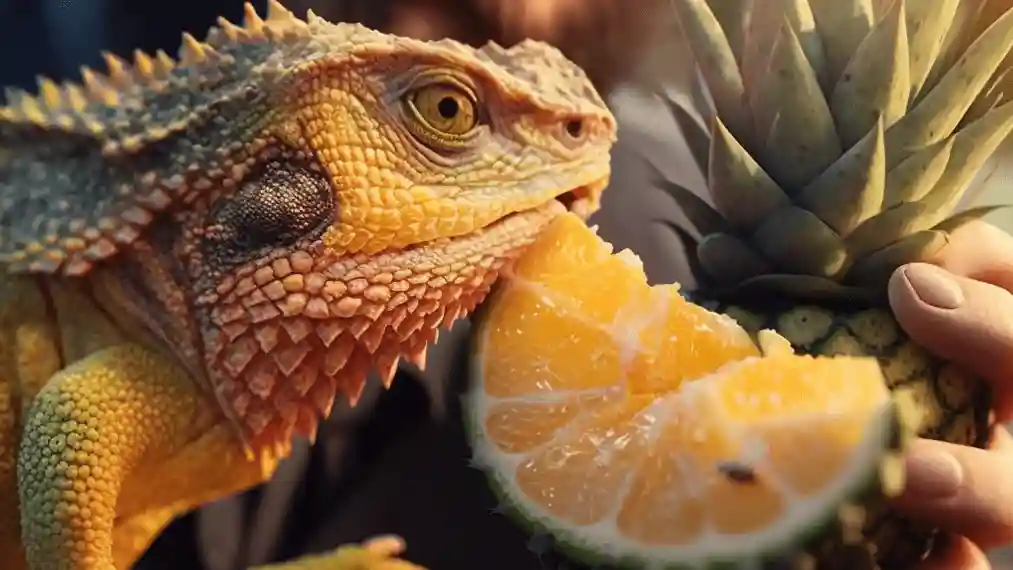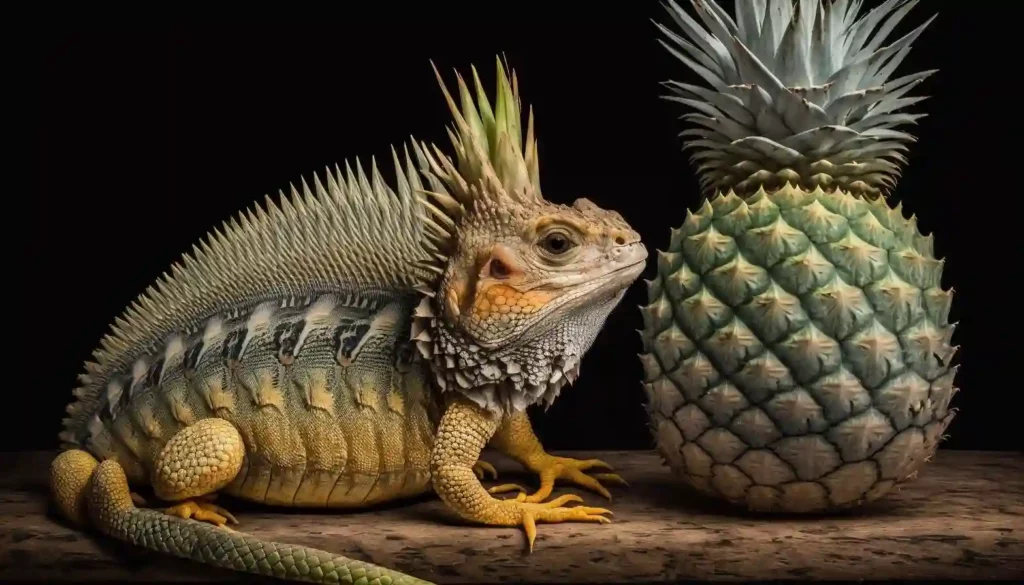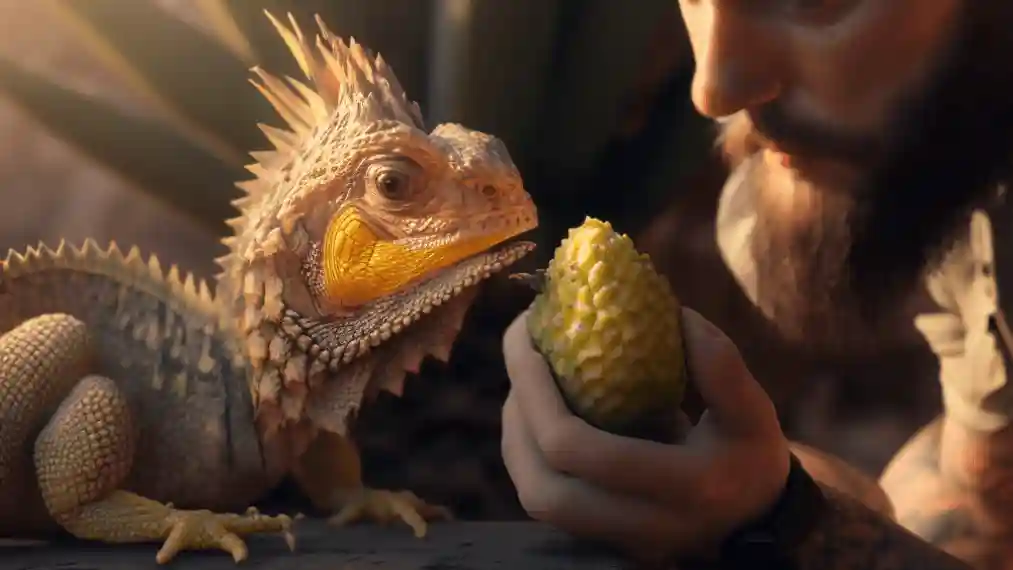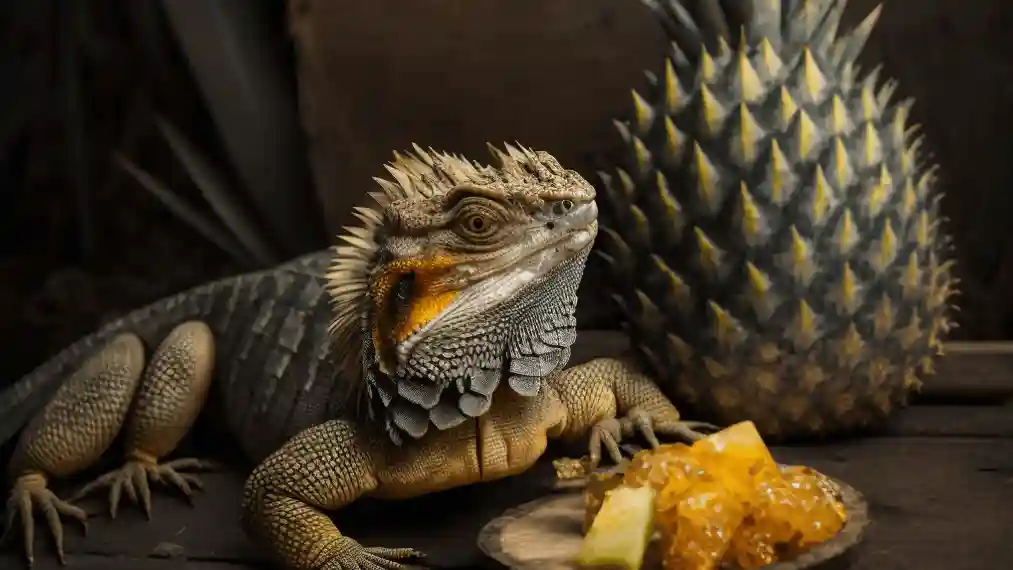Yes, bearded dragons can eat pineapple, but only in moderation. It is recommended to feed them pineapple once or twice a month as an occasional treat.
Pineapple is not toxic to bearded dragons, but it contains oxalates that prevent calcium absorption.
Pineapple is high in sugar, which can lead to obesity and other health problems for lizards.
Fresh fruit is always the best option, but frozen pineapple should be thawed before feeding to avoid throwing off the delicate balance of a bearded dragon’s digestive system.
Canned fruit may lose some nutritional value and may contain added sugars.
Pineapple has health benefits like high vitamin C content, but it also creates some health concerns for bearded dragons such as high acidity, sugar, and phosphorus content.
Potential Benefits Of Feeding Pineapples To Your Bearded Dragon

Feeding pineapples to your bearded dragon can have potential benefits, as well as risks. Here are some of the benefits of feeding pineapples to your bearded dragon:
- Vitamins and Minerals: Pineapples are full of vitamins, minerals, and antioxidants that can help your bearded dragon stay healthy. For example, pineapples contain vitamin C, which can boost the immune system, and manganese, which can help with bone health.
- Energy: The carbohydrates, water content, and other nutrients in pineapples can provide energy and help regulate metabolism to keep your dragon going.
However, it is important to note that feeding pineapples to your bearded dragon should be done in moderation, as there are also risks involved:
- High Sugar Content: Pineapples are high in sugar, which can be harmful to your bearded dragon if consumed in excess. Too much sugar can lead to obesity, diabetes, and other health problems.
- Acidic Content: Pineapples are also acidic, which can cause digestive issues and mouth sores if consumed in large amounts.
Overall, it is safe to feed pineapples to your bearded dragon once or twice a month, but it is important to do so in moderation and to monitor your dragon’s health for any adverse reactions.
Risks Of Feeding Pineapples To Your Bearded Dragon
Feeding pineapple to your bearded dragon can have both benefits and risks. Here are the risks of feeding pineapples to your bearded dragon:
- Oxalates: Pineapple contains oxalates, also called oxalic acid, which can be problematic for bearded dragons. Oxalates, like phosphorus, prevent calcium absorption, which can lead to metabolic bone disease.
- Digestive upset: Too much pineapple can lead to digestive upset, including diarrhea and vomiting, which can be extremely dangerous for your pet.
It is important to note that while pineapple is not toxic to bearded dragons, it should be fed in moderation.
Pineapple can be safely eaten by bearded dragons once or twice a month. If you are unsure about feeding your bearded dragon pineapple, consult with a veterinarian who specializes in reptiles.
The Nutritional Value Of 100g Of Pineapple
Based on the search results, here is the nutritional value of 100g of pineapple:
- Calories: 48
- Fat: 0.2g
- Sodium: 1.7mg
- Carbohydrates: 22g
- Fiber: 2.3g
- Sugars: 16.3g
- Protein: 0.9g
- Vitamin C: Not specified in the search results, but pineapple is known to be a good source of vitamin C
Please note that the nutritional values may vary slightly depending on the variety of pineapple and the source of the information. It’s always a good idea to consult a registered dietitian or healthcare professional for personalized nutritional advice.
What Type Of Pineapple Should Avoid Feeding Your Bearded Dragon?

While pineapples are generally safe for your reptile companion, different varieties and parts contain varying levels of sugar, acidity, and other toxic compounds that can cause health problems.
Specifically, one should avoid giving their pet any canned or frozen pineapple, as well as avoiding fresh-skinned pineapple or pineapple juice which may contain high concentrations of sugar and acids.
It is also recommended to remove all its leaves before serving them to your pet in order to minimize the risk of allergies from the prickly foliage.
Despite being considered a non-toxic fruit overall, wild-caught bearded dragons might not tolerate the sweetness or texture of some types of pineapple since they are not used to eating this food item in their natural habitat.
It is important to take caution when introducing pineapples into your bearded dragon’s diet by starting off slowly with small portions while closely monitoring his reaction over time.
How To Prepare & Serve Pineapples To Your Bearded Dragon?

If you want to feed your bearded dragon pineapple, it is important to do so in moderation. Pineapple has sugar, which is not good for bearded dragons in high amounts. Here are some steps to prepare and serve pineapple to your bearded dragon:
- Cut the pineapple into small pieces. Be sure to remove the skin and core, as they are not safe for bearded dragons to eat.
- Offer the pineapple as an occasional treat, not as a regular part of your bearded dragon’s diet. Feeding pineapple to your lizard more than once a month may cause health problems.
- Monitor your bearded dragon’s reaction to the pineapple. If it shows any signs of discomfort or digestive issues, stop feeding it pineapple immediately.
Remember that a bearded dragon’s diet should consist primarily of insects and vegetables, with fruit being an occasional treat. If you have any concerns about your bearded dragon’s diet, consult with a veterinarian who specializes in reptiles.
Why Can’t Bearded Dragons Eat Pineapple All The Time?
Pineapple is safe for bearded dragons to eat in moderation. However, it should not be given to them all the time because of the following reasons:
- Sugar Content: Pineapple has sugar, which is not good for bearded dragons in high amounts. Too much sugar can lead to health problems.
- Oxalates: Pineapple contains oxalates, which can bind to calcium and prevent its absorption. This can lead to metabolic bone disease, a serious condition that affects the bones of reptiles.
Therefore, while bearded dragons can eat pineapple occasionally, it should not be a regular part of their diet. A balanced diet that includes a variety of fruits, vegetables, and insects is essential for their health.
